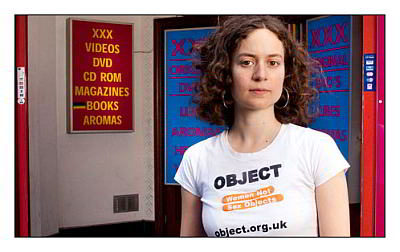Anna van Heeswijk is the newly appointed CEO of Object and is currently pursuing what needs to be done to amend the sexualisation and misrepresentation of women in the press and within todays society.
Was Van Heeswijk nervous about taking on News International? ‘No.’
No one was surprised when Anna van Heeswijk became a women’s rights campaigner. Raised in a strongly political household, her mother active in a women’s group, “there was no way I wasn’t going to be a feminist”, she says.
By the age of four, Van Heeswijk had visited Greenham Common women’s peace camp and by 13 she had attended the United Nations world conference on women in Beijing. Now 30, she’s embarking on her most high-profile feminist role yet.
As newly appointed CEO of Object, Van Heeswijk is at the helm of one of the most influential feminist organisations in the UK and tasked with spearheading the fight against the “pornification” of society.
The appointment comes only weeks after Van Heeswijk gave evidence to the Leveson inquiry about the sexist portrayal of women in the press. Armed with a catalogue of images published by the Sun, the Sport and the Star, she exposed how frequently women are portrayed as sex objects through features like Page Three.
“Our argument and solutions are simple,” she says. “This type of sexually objectifying material would be restricted on television because of the recognised harms associated with these stereotyped portrayals of women and it would be considered sexual harassment if it was in the workplace. Why is it, then, that they should be printed in mainstream newspapers which are not age-restricted and are sold and displayed at child’s eye level?” Object, along with Eaves, Equality Now, End Violence Against Women and Turn Your Back on Page Three want this regulatory gap to be closed.
The last time Page Three came under significant attack was in 1986 when Clare Short railed against it in parliament. Short’s protest was unceremoniously crushed by the Sun, which superimposed her face on a topless model.
Was Van Heeswijk nervous about taking on News International? “No. Because I know that we don’t stand alone. We stand shoulder to shoulder with thousands of people across the UK who are sick of this sexism.”
This time the protest hasn’t been shut down so easily. Sun editor Dominic Mohan was recalled to the inquiry to answer Van Heeswijk’s charge and, while his response was predictably dismissive, she is resolute. “It was a historic moment that the editor of the Sun was held to account about Page Three in such a public forum.” Indeed, the legal footing for this so-called “institution” has never looked so precarious.
Object’s campaign to get porn out of the press is one of a series of audacious moves. It was founded in 2003 by Sasha Rakoff at a time when few were willing to speak out against porn, lap-dancing clubs or “lads’ mags” for fear of being labelled prudish or anti-sex. But in the subsequent nine years, Object has racked up two law changes, mobilised a new generation of activists and spearheaded a national debate about the sex industry. Not bad for a group that still has only two paid staff and no office.
It was its campaign to “strip the illusion” about lap dancing that first brought Object to public prominence. “Lap-dancing clubs are often sites of exploitation. They create no-go zones for women who fear walking past them at night and they promote sexist stereotypes of women as sex objects,” says Van Heeswijk. “Yet lax licensing laws had led the number of clubs to double between 2004 and 2008, with local communities powerless to stop the spread.” So Object joined forces with the Fawcett Society and within 19 months a bill strengthening lap-dancing licensing laws was waved through parliament. “It was a huge success and demonstrated the power of collective organising.” But perhaps most important for Van Heeswijk, the campaign “exposed the exploitative nature of the industry and provided a platform for women to speak out about their harmful experiences”.
One of those women was Alexandra. She describes her time working as a lap dancer as “probably the most consistently disempowering and degrading experience I’ve had”. Taking part in the campaign was part of a personal fightback – an experience shared by many of the women I spoke to who have worked with Object.
“Doing something like actually contributing to changing a legal thing, going to parliament, sitting in a room being listened to by politicians, these sorts of experiences can profoundly alter your self-perception,” says Alexandra. After the campaign, Object set up the UK’s first peer support group for women in the industry.
Prostitution – which Van Heeswijk describes as the “ultimate form of objectification” – was the focus for the group’s second parliamentary success. Alongside the women’s group Eaves, its work ensured that it is now a criminal offence to pay for sex with someone who has been exploited.
Eventually Object would like to see the “Nordic approach” to prostitution, which recognises the practice as violence against women, thereby criminalising the “johns” while decriminalising the women and helping them leave the trade. The campaign was a milestone. “It’s the first time punters have been held accountable for the role they play in fuelling such an exploitative industry.”
Lest anyone should think Object’s success has been for lack of powerful opponents, Van Heeswik reminds me that they are “taking on a multi-million pound industry with vested interests to grow and expand. This opposition has taken many forms, not always completely upfront.” On the day Object launched its “stripping the illusion” campaign, club owners united and launched the Lap Dancing Association. Similarly, on day one of its campaign to reform prostitution laws there was a call-out on Punternet – a website where men “rate” women they have paid for sex. “It explicitly called upon brothel owners to speak out against our campaign because of the effect it would have on their industry.”
But some attacks have come from closer to home. Caitlin Moran, in her book How to be a Woman, dismissed Object’s position on pornography as “nuts”. Moran recalled a discussion at an Object meeting about pornography, which “everyone seemed to presume, automatically, had to be banned”. Van Heeswijk remembers it differently.
“In a way it’s a compliment that Caitlin Moran gave such prominence to a one-off meeting organised by Object in her bestselling book. But what is a shame is that she didn’t take the time to research Object’s position. We campaign to see an end to the industry-driven misogynistic, racist pornography that fills the internet and filters into popular culture. This involves much more strategic planning than something as crude as wanting something banned.”
For Moran, the solution is to produce more porn – “free-range” porn, porn she’d be happy to pay for. It’s not a strategy shared by Van Heeswijk. “You can’t be naive to the fact that this is a powerful multinational, profit-driven industry. It therefore requires a political and collective response, not an individualised solution. Also, the idea that we can pay for nicer porn is problematic because it’s not understanding the power dynamics at play when you introduce money into the situation.”
It is this political understanding of the power at play that sets Object apart. It is not about to be distracted by the fanciful notion that the millions of men masturbating to footage of women being brutally degraded simply haven’t stumbled across feministporn.com yet. Nor is it under any illusion that watching a person having sex because they need money, not because they freely desire it, will ever be free from the risk of harm. It is no coincidence that 68% of women who undergo unwanted sex in exchange for money have post traumatic stress disorder.
For now, Van Heeswijk’s focus is firmly on Rupert Murdoch. Shortly after giving evidence to Leveson, Object requested a meeting with him. His response was brief. “Ladies, I have read the proceedings before the Leveson inquiry and have nothing to add to what Mr Dominic Mohan said at that time.” So the “ladies” are planning to protest outside News International. You cannot help thinking that Murdoch should be concerned.
Kat Banyard is author of The Equality Illusion: The Truth about Women and Men Today.









